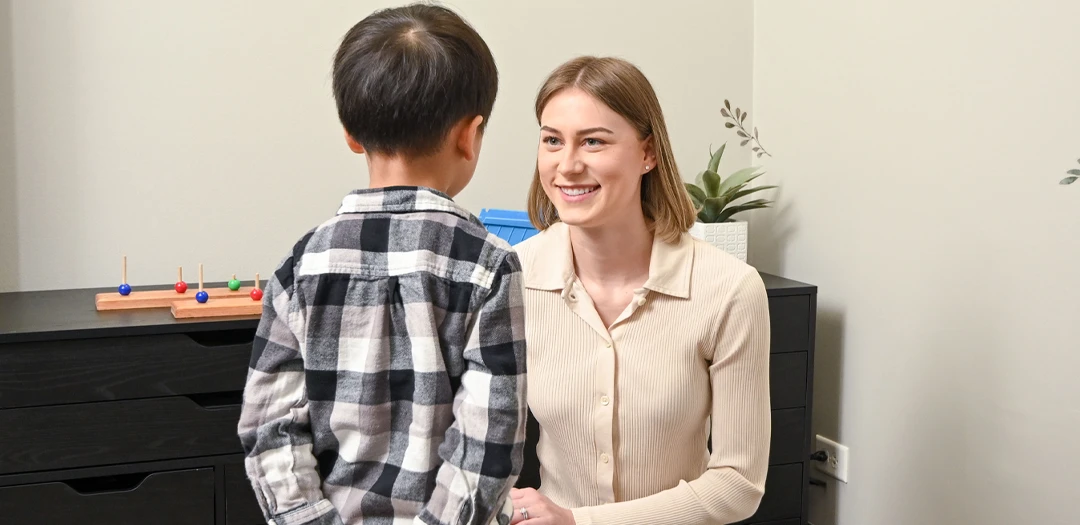
FAQs ABOUT NEUROPSYCHOLOGY AND TESTING
NeuroMind – Schaumburg, IL
FAQs Table of Contents
FAQs About Pediatric Neuropsychology
FAQs Specific to Neuropsychological Testing at NeuroMind
NeuroMind Testing Overview
FAQs About Autism Testing
FAQs About ADHD Testing
FAQs About Testing for Dyslexia
FAQs About Testing for Giftedness (Advanced Cognitive Profile)
Getting Started With Testing
FAQs About Illinois School Plans
FAQs About Pediatric Neuropsychology
What is neuropsychology?
According to the American Psychological Association, neuropsychology investigates the brain and nervous system processes related to behavior and thinking. It looks at typical function, neurodiversity, and dysfunction.
What is a pediatric neuropsychologist?
The American Academy of Clinical Neuropsychology (AACN) defines a pediatric neuropsychologist as a licensed clinical psychologist with special training in neuropsychology.
Neuropsychologists, such as NeuroMind’s Esther Chin, Ph.D., don’t just assess achievement. They also understand how the brain develops and how injury, brain development differences, special circumstances, or specific medical diagnoses can affect:
- Thinking
- Learning
- Behavior
- Emotions
- Social interactions and relationships
Dr. Chin is a clinical child psychologist and a pediatric neuropsychologist in Schaumburg, Illinois. She speaks English and Chinese (Chinese and Mandarin).
What is neuropsychology testing or a neuropsychological evaluation?
In children and teens, pediatric neuropsychological evaluations involve a comprehensive assessment of your child’s cognitive (thinking) abilities and much more.
At NeuroMind, we want to understand your child holistically. To that end, we integrate the following:
- Clinical interviews
- Communication with other relevant professionals who serve your child
- Questionnaires
- School or medical record reviews
- Standardized tests
- Behavioral observations
The evaluation may also involve assessing your child’s:
Cognitive functioning
- Intellectual functioning
- Attention and impulse control abilities
- Executive functioning (planning and organizational skills, multitasking, and problem-solving abilities)
- Memory
- Language skills
- Social abilities and interactions
- Visual-spatial perception
- Fine motor skills
School performance
- Reading
- Writing
- Math
Emotional and behavioral functioning
- Anxiety and depression
- Frustration tolerance
- Aggressive and inappropriate behaviors
What does neuropsychological testing reveal?
After collecting and integrating all the data, we provide a summary report of the neuropsychological evaluation.
It includes a:
- Clinical summary
- Road map for future success (our recommendations)
We also provide a virtual feedback session to help you and your family move forward and unlock your child’s maximum potential.
By understanding how your child processes information differently, we help identify:
- Areas of strength
- Areas for improvement
We will also:
- Advocate for your child’s needs.
- Assist you in navigating school or community resources to maximize your child’s potential across settings.
What does a pediatric neuropsychologist do?
A pediatric neuropsychologist, such as Esther Chin, Ph.D., at NeuroMind, can:
- Assess your child (called neuropsychological testing), provide feedback, and identify or rule out specific diagnoses, syndromes, or disorders.
- Offer life-changing strategies for schools, parents, and physicians to help children achieve their maximum potential.
- Help communicate with schools and advocate for your child.
- Offer education, resources, and strategic plans for your child’s success based on scientific data.
How are pediatric neuropsychological tests used?
The AACN explains that a neuropsychological assessment can:
- Unlock your child’s potential.
- Explain how behaviors, emotions, or cognition (thinking) may result from brain differences.
- Enhance understanding about how your child learns, sharing information with parents, the child or teen, physicians, and schools.
- Match expectations based on your child’s strengths and weaknesses.
- Aid in medical treatment plans, providing a baseline and subsequent evaluation after treatment or intervention.
- Identify what types of strategies facilitate your child’s unique learning and development.
- Leverage your child’s specific strengths and appreciate weaknesses to better focus school plans, identify potential areas of risk, and minimize future difficulties.
- Open the door to educational services.
Why did our doctor refer my child for neuropsychological testing? (many medical diagnoses)
A neuropsychological evaluation may help if your child has a specific medical diagnosis or if a doctor notices your child is lagging in specific developmental milestones.
Your Doctor’s Referral Because of a Medical Diagnosis
Neuropsychological testing is appropriate for many children with medical diagnoses. Among these may be:
- Brain injury, trauma, or tumor
- Cerebral palsy (CP)
- Childhood cancer
- Chronic heart or breathing problems
- Concussion or mild traumatic brain injury (mTBI)
- Diabetes mellitus
- Epilepsy or seizure disorders
- Exposure to toxins, such as lead, drugs, alcohol, smoke, carbon monoxide
- Genetic disorders, such as Down syndrome or neurofibromatosis type 1 (NF1)
- Hydrocephalus
- Neurological disorders
- Prematurity
- Spinal bifida
- Stroke or brain infection
- Tourette syndrome and other tic disorders
- Tuberous sclerosis (TS)
- Child exposure to lead, drugs, alcohol, smoking, or inhalants (carbon monoxide)
Your Doctor’s Referral for a Suspected Developmental or School Problem
Your doctor may have other reasons for referring your child for neuropsychological testing. For example:
- Your child missed specific developmental milestones during routine screenings.
- An evaluation from a school psychologist indicated that a post-evaluation treatment intervention hasn’t helped.
- Your child’s school is reporting suspected developmental problems, such as a learning disability, attention-deficit/hyperactivity disorder (ADD/ADHD), and autism spectrum disorder (ASD).

Where We Are
NeuroMind serves children and families throughout the Chicagoland Area, especially the west and northwest suburbs. We are located in Schaumburg, IL, near I-90 and the Meacham Road exit, Our address is:
1365 Wiley Road, Suite 147, Schaumburg, IL 60173
How To Begin
We’re here to help. Connecting a child to NeuroMind testing and services is the same whether you're a medical provider, therapist, school personnel, concerned parent, foster parent, or guardian.
At any time, day or night, please leave a voicemail at:
Include your name, phone number, email, and the best time to reach you.
We'll contact you as soon as possible (usually within 1-2 business days).
FAQs Specific to Neuropsychological Testing at NeuroMind
How much does neuropsychological testing cost?
Nobody likes financial “surprises.”
Neuropsychological testing can be expensive without insurance. Depending on the appropriate set of tests for your child and without insurance or other resources, neuropsychological testing can cost upwards of $3,600 to $4,600.
As a courtesy, we will verify your child’s insurance benefits. We also provide an estimate of out-of-pocket costs you might incur.
Does insurance cover neuropsychology testing?
Most private health insurance companies will cover at least part of the cost of neuropsychological testing, depending on your plan, year-to-date out-of-pocket expenses, and deductibles.
As a courtesy, NeuroMind always verifies insurance benefits for you. We’ll provide an estimate of any out-of-pocket payments before we schedule your child’s testing.
What types of healthcare insurance does NeuroMind accept?
At NeuroMind, we accept the following payors:
- Aetna
- Blue Cross Blue Shield PPOs
- United Healthcare
What type of payments do you take?
We accept a variety of traditional and online payments:
- ATM/Debit
- Cash or Check
- Credit Cards: American Express, Mastercard, and Visa
- Flexible Spending Account (FSA) cards
- Health Savings Account (HSA) cards
- Insurance: Aetna, Blue Cross Blue Shield PPOs, and United Healthcare
- Zelle payments (info@neuromindpsych.com)
What should I do to prepare my child or adolescent for neuropsychology testing?
Here are some ideas to help prepare your child for the neuropsychological testing evaluation and ensure it goes smoothly.
Tell Your Child Whom They Will Meet
Let your child know they are coming to NeuroMind and who they will meet. Our photos are on the website in the about section.
Explain What Will Happen
Tell your child they will play various number and word games and solve puzzles —but they’re not being “graded.” Tell them the questions or games may start “easy” but will get more challenging as they go along. Tell your child this means they are doing a great job.
Foster Success
- Set Expectations. Explain that your child might be asked to try tasks that older kids or those in higher grades can do. Tell them it’s ok to guess the answer if they don’t know it. The only expectation is that they try to do their best.
- Consider Incentives. Consider bringing small items (e.g., stickers, fruit snacks, etc.) to help your child stay engaged throughout the testing. You know your child best.
- Bring Snacks. Pack light snacks and a water bottle for your child. We will take mini-breaks.
- Allow Comfort Toys. If your child has a favorite toy or blanket, it’s ok to bring it. It will help your child feel more comfortable in a new place with new people. Also, 1-2 stuffed toys, fidgets, or gadgets are allowed for playtime during breaks.
Let Your Child Know Where NeuroMind Is
NeuroMind is in Schaumburg, near I-90 and the Meacham Road exit. Let your child know if you have a long or shorter drive.
For a younger child, you might say, “It will be two Blue’s Clues to get there.”
For older children, “We’ll be there in about 15 minutes.”
Give a Simple Explanation
Tell your child why they are coming to Neuromind. Explain that people have different thinking styles. These tasks will help your child and everyone else better understand your child’s unique thinking style.
NeuroMind Testing Has 3 Parts
PART 1: Virtual Parent Interview
NeuroMind sends you a Zoom link. Before testing, you will have a 1-hour interview with a NeuroMind provider. We will learn more about your child and your concerns.
PART 2: Testing Day In Schaumburg
Testing lasts a full day for children ages 6 to 18. For children at age 5 or younger, testing usually occurs in two half-days.
Typically, we begin at 8:30 a.m.
PART 3: Results & Recommendations
After integrating all data, NeuroMind will host a second 1-hour Zoom meeting. Our provider will provide preliminary results, answer your questions, and provide specific recommendations.
FAQs About Autism Testing
What is the test for autism or autism spectrum disorder (ASD)?
Autism spectrum disorder is on the rise, now affecting one in every 36 children by the age of eight years.
There is no single test for autism spectrum disorder (ASD). However, a pediatric neuropsychologist can conduct tests to determine if your child falls on the autism spectrum. Some developmental pediatricians and pediatric neurologists can also make the diagnoses.
NeuroMind is located near I-90 at the Meacham Road exit in Schaumburg, Illinois. It offers testing to help rule in or out if your child or teen has a condition on the autism spectrum or disorder. We speak English and Chinese (Mandarin or Cantonese).
To get more precise answers about ASD or to identify helpful strategies, please leave a voicemail regarding ASD testing at:
(224) 801-4514.
Include your name, phone number, email, and the best time to reach you, and we will contact you as soon as possible (usually within 24-48 hours or 1-2 business days).
At what age can you test a child for autism or autism spectrum disorder (ASD)?
Opinions vary about the age for testing a child for autism or ASD. However, sources agree that the earlier the diagnosis, the sooner your child can receive the necessary support to be successful.
The American Academy of Pediatrics (AAP) recommends that pediatricians screen children for autism spectrum disorder between ages 18 and 24 months. However, screening alone may not be able to identify all children, especially those with milder forms of ASD.
The Centers for Disease Control and Prevention (CDC) reports that a diagnosis can be reliable when a child is about two years old.
NeuroMind offers neuropsychological testing that can diagnose ASD in children ages two years or older. We speak English and Chinese (Mandarin or Cantonese).
To get started, please leave a voicemail regarding ASD testing at
(224) 801-4514
Include your name, phone number, email, and the best time to reach you, and we will contact you as soon as possible (usually within 24-48 hours or 1-2 business days).
FAQs About ADHD Testing
What are some signs of ADHD?
You may want ADHD or ADD testing if your child is:
- Frequently daydreaming
- Easily distracted
- Disorganized and forgetful
- High energy
- Impulsive
- Inattentive when spoken to
- Struggles when it comes to waiting or taking turns
- Talks non-stop
How and where can I test my child for ADHD near me?
A pediatric neuropsychologist can assess your child for attention deficit hyperactivity disorder (ADD/ADHD) to provide a definitive diagnosis.
Esther Chin, Ph.D., is a neuropsychologist with a particular interest in ADHD and other inattentive behaviors.
We speak English and Chinese (Mandarin or Cantonese).

FAQs About Testing for Dyslexia

Where can I get my child tested for dyslexia?
At NeuroMind, we have that specific training. Esther Chin, Ph.D., and her team can evaluate and diagnose a child with a learning disability, disorder, or difference. This includes differences in reading (dyslexia), writing (dysgraphia), or math (dyscalculia).
Who can diagnose dyslexia?
Only a clinical psychologist with a superb understanding of dyslexia should evaluate and diagnose dyslexia.
FAQs About Testing for Giftedness (Advanced Cognitive Profile)
Can a neuropsychological evaluation identify giftedness?
Yes.
NeuroMind offers neuropsychological testing to identify an advanced cognitive profile (giftedness) in children ages two years or older. We speak English and Chinese (Mandarin or Cantonese).
To get started, please leave a voicemail regarding gifted testing at
(224) 801-4514
Include your name, phone number, email, and the best time to reach you, and we will contact you as soon as possible (usually within 24-48 hours or 1-2 business days).
What are the advantages of identifying an advanced cognitive profile (giftedness)?
Most families who contact us have specific concerns about a child who seems more advanced than others their age. Other parents want to further support a child’s advanced skills.
By identifying an exceptional skill set in your child, we can provide information to determine if your child is eligible for enrichment activities or a gifted program.
At the same time, children with advanced skill sets are more vulnerable to heightened sensitivity and emotional intensity. They may struggle with self-esteem issues and problems with focusing and planning/organizational skills. Neuropsychological evaluation can help ensure that parents, foster parents, or guardians provide sufficient support for a child with exceptional skills.
Getting Started With Testing
As Easy as 1-2-3
STEP 1: Contact Us.
Reach out to NeuroMind 24/7 and leave a voicemail at:
You will hear back from us within two business days. Include your name, phone number, email, and the best time to reach you, and we’ll contact you as soon as possible.
STEP 2: Provide Your Child's Insurance Information.
As a courtesy, we will verify your child’s insurance benefits and estimate any out-of-pocket costs you may incur.
STEP 3: Schedule an Appointment & Complete the Paperwork.
We will offer you the first available appointment.
You will receive consent forms and other paperwork electronically from Tebra (our medical system). Please complete the paperwork 1-2 days before your Zoom appointment.
FAQs About Illinois School Plans
What Is an Individualized Educational Plan (IEP)?
An Individualized Educational Plan (IEP) is a plan or program developed to ensure that a student ages three to 21 who has a disability identified under the law and is attending an elementary or secondary educational institution receives specialized instruction and related services.
It falls under the Individuals with Disabilities Education Act (IDEA) and has a narrower definition of “disability” than the 504 Plan.
See a list of specific disabilities covered under an IEP.
An IEP provides individualized special education in the least restrictive environment and related resources to meet students’ unique needs.
It requires re-evaluation every three years or more frequently.
What Is a 504 Plan?
An Illinois 504 Plan is a school plan for students ages three to 22 who have a disability that does not require special education services. According to The Learning Disabilities Association of Illinois, the 504 plan provides a blueprint for how a school will provide support and remove barriers for the student.
It is covered by the Rehabilitation Act of 1973, which defines a “disability” more broadly than an Individualized Education Plan.
It may or may not carry over into accommodations for college or other postsecondary programs.
It requires “periodic re-evaluation,” which is not clearly defined. However, testing can occur no more than once a year.



